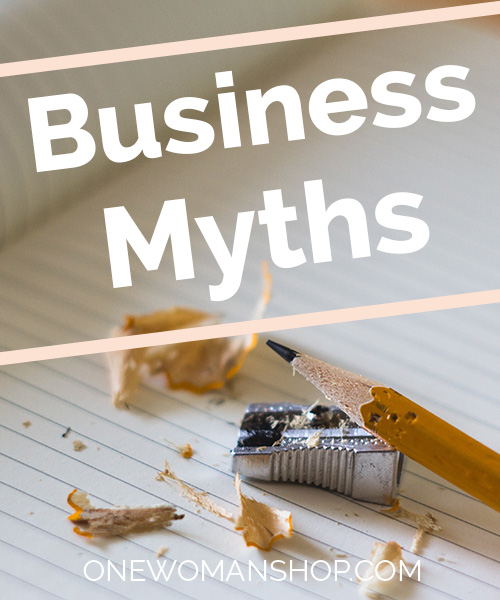Welcome to Business Myths. Here’s the deal: we often hear business “truths” and accept them as true without stopping to question them. We’re chatting with solopreneurs and freelancers who have learned the hard way that these commonly accepted facts may not, in fact, always be true. In this case, Ashley shares her take on why “investing in yourself” isn’t always a no-brainer.
It’s commonly stated, and widely believed, that “investing in yourself” (aka buying a course, program, membership, etc.) is the best thing you can do for your business.
There’s a lot of wisdom in that advice. After all, you are your business, and the more you improve your skills and abilities, the better you’ll be able to run the show and the better your bottom line will look.
While I do agree that the right training can allow you to leapfrog ahead of where you’d be if you figured everything out on your own, I don’t necessarily agree that plinking down money for the program or course dancing in front of you is a no-brainer.
The value of learning
I don’t for one second want to give the impression that there isn’t value in identifying an area of weakness (or finding a new entrepreneurial front to move into) and then strengthening your skills in that area. In fact, there’s a lot of value in courses, coaching and programs, and I’ve taken advantage of quite a few myself.
Here’s the beef: “investing in yourself” this way is only going to pay off (making it a successful “investment”) if it’s the right education at the right time:
- when you’ve hit a roadblock and this will get you through it;
- when you need a new skill and taking a course will enable you to leap-frog;
- when you’re just starting out and totally green and lost;
- when it makes strategic sense and you can afford it.
Basically, investments need to pay off. That’s pretty much the definition of a good investment. And when you sign up for every new opportunity without really looking at how it supports your long-term strategy, you aren’t necessarily making good investments.
A justified distraction?
Often, a new course or program can be a dressed-up form of distraction, also known as procrastination.
As an entrepreneur, there comes a time when you need to stop learning and start doing. When you don’t feel confident landing new clients, for example, it’s easier to take a course on landing new clients than it is to start digging, marketing, pitching, and bracing for rejection. So instead of doing the hard and scary work that leads to actual dollars in your pocket, you sign up for one more webinar, join one more program, or study one more blogger’s advice.
In my experience? Not a winning strategy. You’d likely be better served by pitching and asking for peer reviews.
Pretend-productive procrastination?
Fear -- of failure, of rejection, of success. Boredom. Intimidation or inadequacy. Shiny Object Syndrome. Imposter Syndrome. Habit. Envy. Lack of vision or strategy. These are just some of the reasons so many of us reach for our wallets when a new opportunity to learn something comes up.
If you’re considering a new personal development program, take a hard look at why you want it in the first place. If it’s to fill an actual knowledge gap you’ve identified, have at it. It’s another thing entirely if you’re telling yourself this is “the thing” that will “get you there” -- wherever “there” is.
Know what your goals are, be clear on exactly how this new investment will serve you and your business, and commit to following through. That’s the only way it’s going to pay off. (See definition of investment, above.) Anything less is just procrastination… potentially expensive procrastination.
Rationalized overspending?
There's also the case where you may sign up for the next big thing without really considering the financial impact. Tune into your business for a minute, first.
Taking advantage of these opportunities indicates that we expect them to lead to a lot more money down the road. But before we get to the “down the road” part, they cost money now.
Money going out has a direct impact on profitability. Too much money going out could mean that you lose your profitability, and that’s obviously not good for business.
Learning how to run your business well and level up in your craft is important, yes, but so is operating without burying your financial future under the crushing weight of your friends Visa and MasterCard. Staying right-side-up matters! Possibly more than that $997 membership with $4,000 in bonuses! Know your business, and whether or not you can handle it.
Just be smart
There are many times when paying for personal development products is exactly what you need for your business -- but with so many of these opportunities cropping up all the time, it’s easy to get swept away. Pay attention to how you’re putting these investments to work, keep an eye on your bottom line, and don’t let the idea of “investing in yourself” become such a no-brainer that it ends up getting in the way of real growth and development.
Ultimately, when you’re the boss you’ve got to manage all your resources -- including money, time, strategy, and yes, your personal and business growth and development.
Tell me: how do you make the decision on what to invest in for your biz?
Latest posts by Ashley Gainer (see all)
- Business Myth: Investing In Yourself Is Always a Good Idea - September 24, 2015










leave a comment